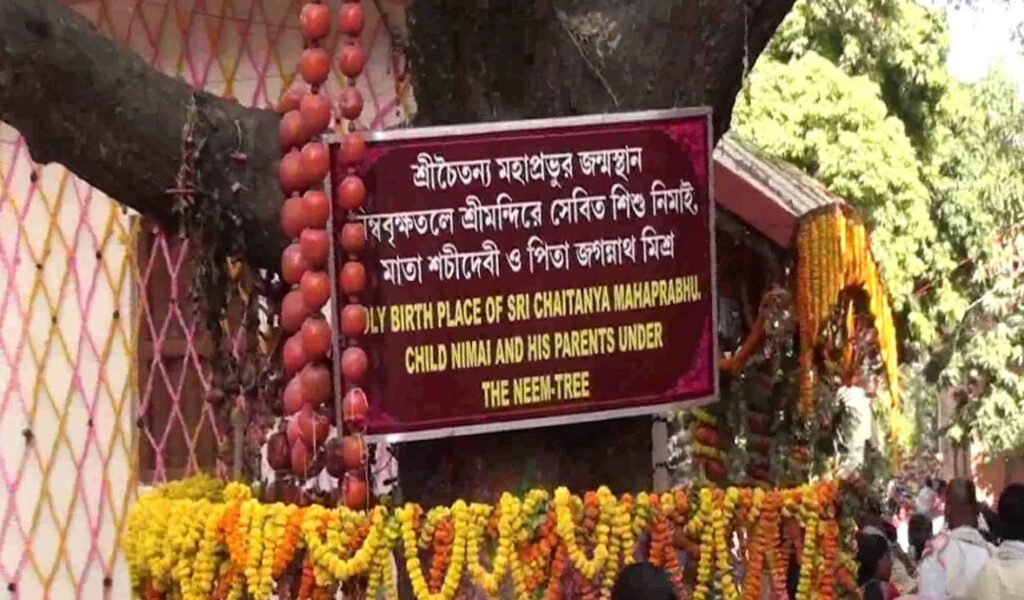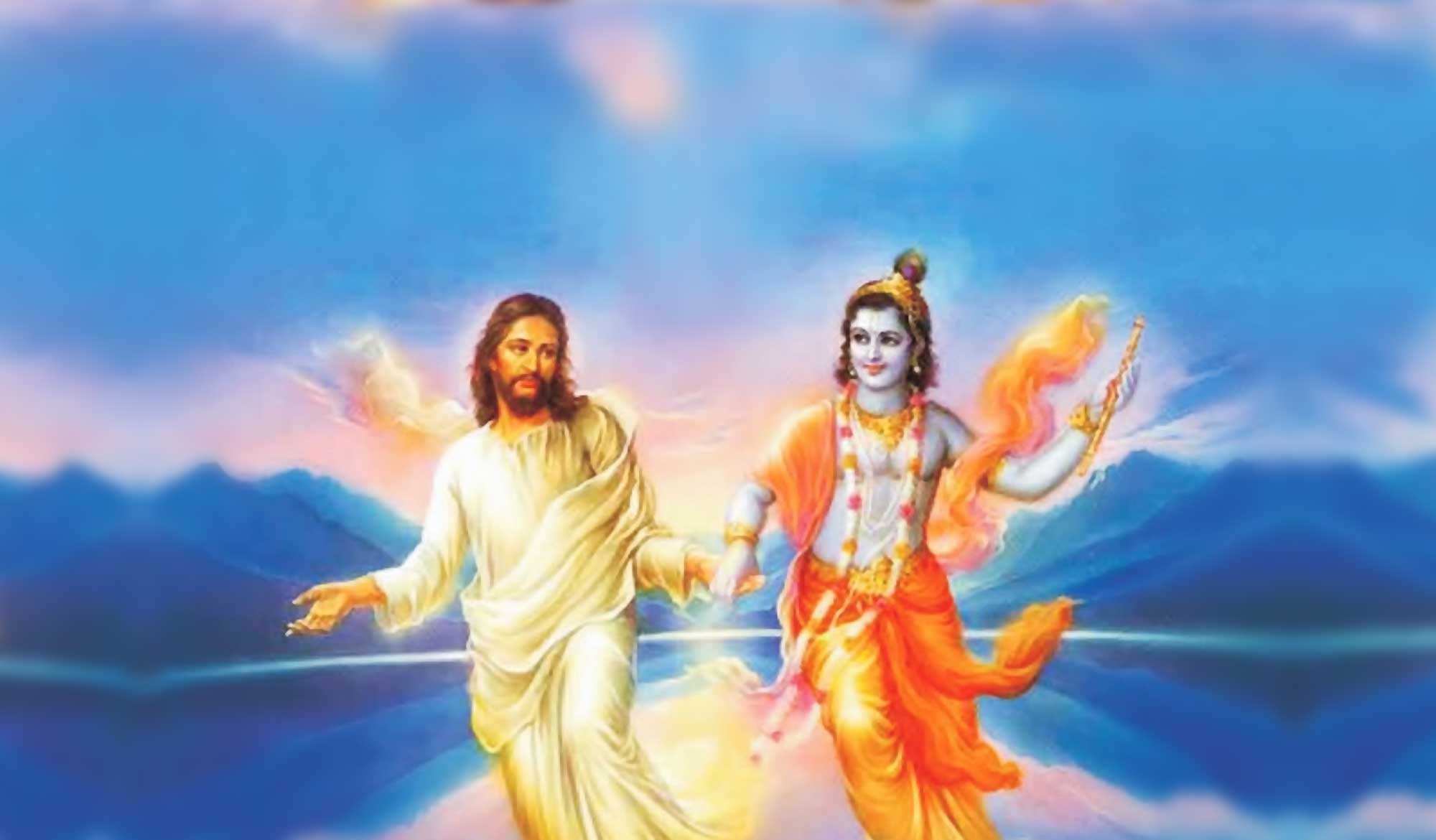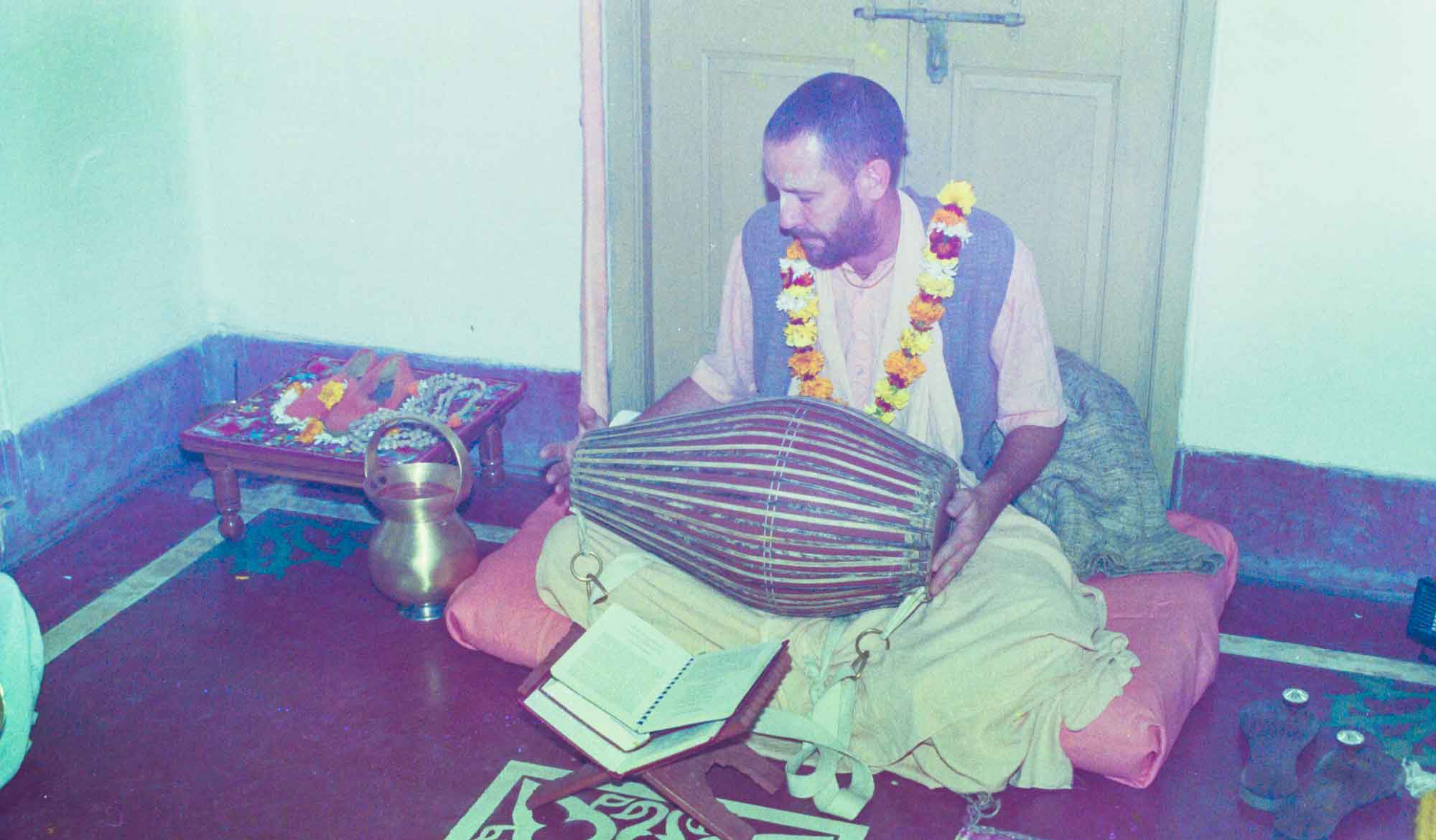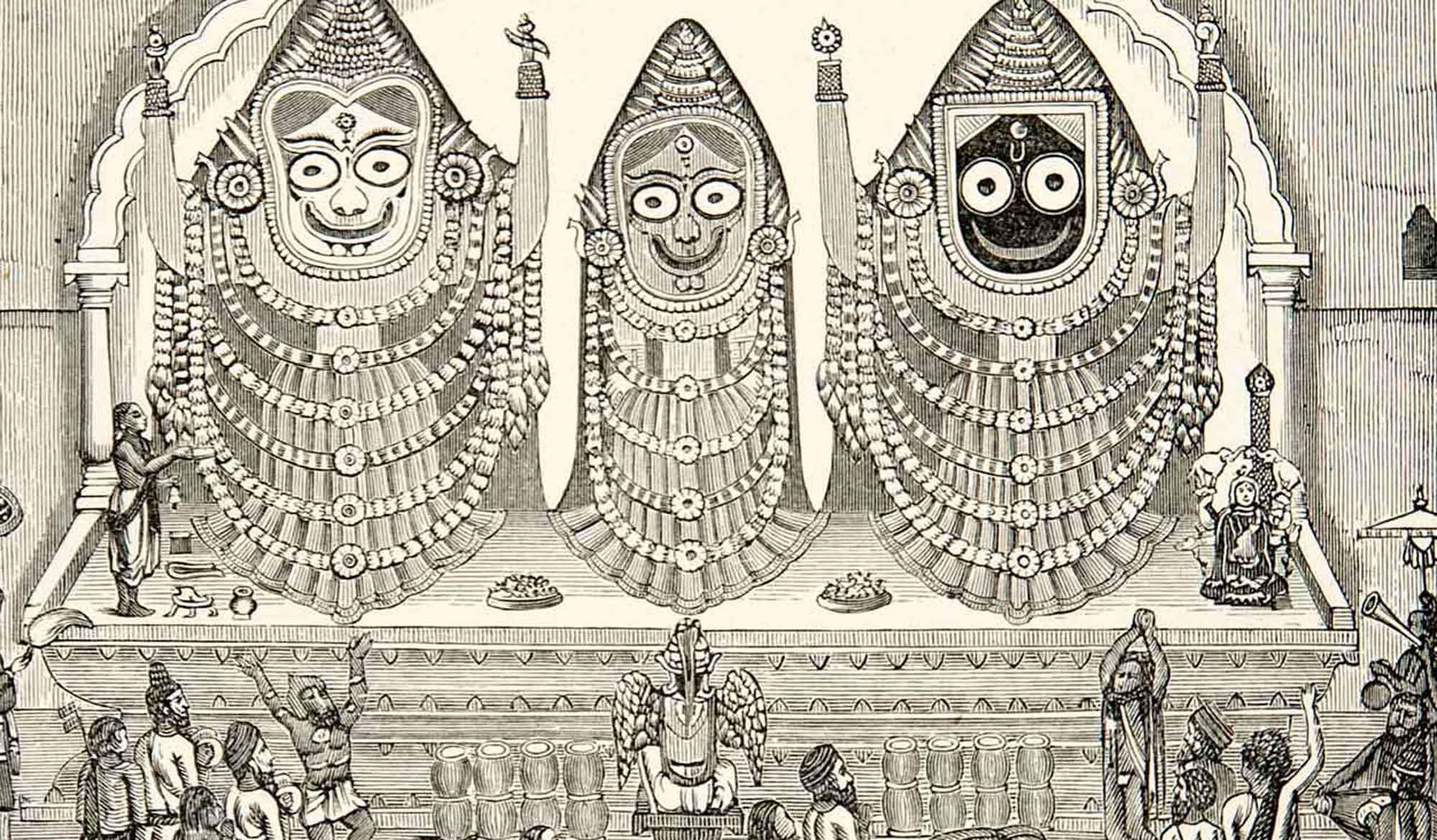by Swami B.G. Narasingha
‘Meditation and the Holy Name’ was written by Swami Narasingha in July 2000. Narasingha Maharaja is asked what should one meditate upon while chanting, especially in a world which is full of distractions. Maharaja responds with quotes from the śāstra and the previous ācāryas, as well as the advice of Śrī Caitanya Mahāprabhu.
Question: What should be the meditation of the mind while engaged in chanting the Holy Names of the Lord? So much of our mental activity is centered on the flickering thoughts of our daily lives. How shall I find money? I want this or that. He has spoken to me in an offensive manner, so I must retaliate. How must I deal with this person to gain the upper hand? I want to be independent. I am tired of having people tell me what to do. I must do this, so that I will receive this result. As you can see, one’s whole chanting experience can be occupied by the dictates of the mind and very little room is there for sincere meditation. I have been told that the process is gradual, but I can see that practically these thoughts never seem to cease. Even in an atmosphere of service and association one’s mind is still preoccupied with these thoughts.
Answer: Meditation on the sound of the Holy Name itself is the most consistently recommended meditation to perform while chanting japa. The general recommendation is that while chanting japa one should contemplate or meditate on the nāma, guṇa, rūpa, and līlā (name, qualities, form, or pastimes) of Kṛṣṇa. Pārṣadas may also be added to that list Kṛṣṇa’s associates. However, given our present state of spiritual development, the process of meditation on the sound vibration ‘Kṛṣṇa’ is superior. Everything is contained in the transcendental vibration of the Mahā-mantra:
Hare Kṛṣṇa Hare Kṛṣṇa Kṛṣṇa Kṛṣṇa Hare Hare
Hare Rama Hare Rama Rama Rama Hare Hare
In the sound of Kṛṣṇa’s holy name all qualities, form, pastimes and associates of the Supreme Lord are fully manifest or revealed to the sincere chanter. But why, as you have said, even in an atmosphere of service and association, is one’s mind still preoccupied?
There are many books, such as Manaḥ-śikṣā by Raghunātha Dāsa Gosvāmī and Upadeśāmrta by Śrī Rūpa Gosvāmī giving instruction on controlling the mind, but the central focus on this issue can be taken from the prayer of Śrī Caitanya Mahāprabhu:
nāmnām akāri bahudhā nija-sarva-śaktis
tatrārpitā niyamitaḥ smaraṇe na kālaḥ
etādṛśī tava kṛpā bhagavan mamāpi
durdaivam īdṛśam ihājani nānurāgaḥ
“O my Lord, Your Holy Name bestows auspiciousness upon all. You have unlimited names such as ‘Kṛṣṇa’ and ‘Govinda’ by which You reveal yourself. In Your many Holy Names You have kindly invested all Your transcendental potency. And in chanting these names, there are no hard and fast rules concerning time or place. Out of Your causeless mercy, you have descended in the form of divine sound, but due to my offences (great misfortune) I have no attraction (love) for Your Holy Name.”
The word durdaivam, meaning misfortune, has been taken by Bhaktivinoda Ṭhākura and other ācāryas such as our Guru Mahārāja as being synonymous with aparādha or offences. Despite our chanting of the Holy Name, when no taste or ruci manifests, it is to be understood that this is due to offences, nāma-aparādha. There are ten offences to the Holy Name that should be avoided. But experience has shown us that three of the ten offences are more difficult to avoid. Those are sādhu-nindā (Vaiṣṇava aparādha), guror avajña (thinking the guru an ordinary man or neglecting his order), and ahaṁ-mamādi-paramo (continuing to be absorbed in thinking of one’s self and material possessions). If we commit any of these offences, then our taste for the Holy Name does not manifest.
So the first solution is to avoid the ten offences. Then one comes to the stage of nāmābhāsa, or the clearing stage of chanting. Here Śrīla Bhaktisiddhānta Sarasvatī Ṭhākura has mentioned in his commentary to Sanmodana Bhāṣyam by Bhaktivinoda Ṭhākura that in the stage of nāmābhāsa one has to chant continuously, this alone will keep nāma-aparādha at bay.
To become absorbed in continuously chanting the Holy Name of Kṛṣṇa one should also give up material engagement for sense gratification. Sense gratification is the antithesis of devotional meditation. Thus the two cannot be cultivated side by side.
viṣaya chāḍiyā, se rase majiyā,
mukhe bala hari hari
“(If one wants to become Kṛṣṇa conscious) one must give up his engagement in sense gratification and simply become absorbed in chanting the Holy Names; Hare Kṛṣṇa! Hari! Hari!” (Locana Dāsa Ṭhākura)
The key for successful chanting after avoiding the ten offences and giving up material engagement for sense gratification is as follows:
tṛṇād api sunīcena taror api sahiṣṇunā
amāninā mānadena kīrtanīyaḥ sadā hariḥ
“One who thinks himself lower than the grass, who is more tolerant than a tree, and who does not expect personal honour but is always prepared to give all respects to others, can very easily always chant the Holy Name of Kṛṣṇa.”
Kṛṣṇa Dāsa Kavirāja Gosvāmī has stated that one should string this tṛṇād api sunīcena verse on a garland of the Holy Name and wear it always around one’s neck. Humility is therefore the first mandate to follow if one at all desires to be free from offences and experience pure chanting of the Holy Name of Kṛṣṇa.
Bhaktivinoda Ṭhākura has given an explanation to the phrase, tṛṇād api, that our position in material life is more deplorable than straw or grass. The straw, he says, at least does not offer any resistance, it will move with the flow. But we are so unfortunate that if a flow comes down to carry us up to divinity, we always offer some resistance. We are so unfortunate that we resist the will of the Supreme Lord.
Since the departure of our Divine Master, there have been other highly qualified agents of the Supreme Lord who brought down an inconceivable flow of affectionate grace from the Almighty Lord but unfortunately in the name of ‘society consciousness’ many devotees resisted that flow. And we are the losers for that.
All perfection is manifest in the Holy Name of Kṛṣṇa when the name is chanted from the platform of śuddha-nāma, pure chanting. Only śuddha-nāma is the Holy Name proper. Only when one is at the stage of śuddha-nāma does Kṛṣṇa dance on our tongue.
Chanting the Holy Name cannot be lip-deep and still be effective. Chanting śuddha-nāma must be heart-deep. From the deepest side of our consciousness, we must approach the chanting of the Holy Name. The highest ideal of a Gauḍīya Vaiṣṇava is found in rāga–mārga, spontaneous love of Kṛṣṇa, spontaneous chanting of the name. However, we must approach the Holy Name with the greatest sincerity, with great respect, awe, and reverence.
We say that Vaikuṇṭha is the land of awe and reverence and it is below Vṛndāvana, the land of love. But how are we to approach the land of love? Should we not feel great awe and veneration for Vṛndāvana and the Holy Name of Kṛṣṇa that has come down to us from there? Although spontaneous love is our goal, it is never recommended that we deal with the Holy Name in a cavalier spirit.
How much regard did Śrī Caitanya Mahāprabhu and our ācāryas show for the Holy Name of Kṛṣṇa? Did they not deal with this divine sound as the greatest wealth of mankind? If we know the Holy Name to be non-different from Kṛṣṇa, then we must take the Holy Name in that way. It is not a thing for play. Nor is it a sweet ball that we can snatch with our hand and devour. There is a price for śuddha-nāma, and without paying that price no one can experience Kṛṣṇa directly in the chanting.
You have mentioned service and association but I would like to mention that service is rare and association is rarer still. Visits to the temple for the ‘Sunday Feast’ in many cases does not actually qualify as association or sādhu–saṅga. Association means to take the company of those who are situated in a position in devotional service superior to our own. In the company of such higher Vaiṣṇavas, one will begin to yearn deeply within one’s self for real improvement. That yearning or hankering will draw Kṛṣṇa towards us. We will find that as we hanker for improvement of the type as shown to us by the senior Vaiṣṇava, then proportionately we will find that the Holy Name of Kṛṣṇa becomes purely manifest.
When we are given some responsible service to perform by the higher Vaiṣṇavas, then we will experience that the mind focuses more clearly on the Holy Name.
kṛṣṇa-nāma nirantara yāṅhāra vadane
sei Vaiṣṇava-śreṣṭha, bhaja tāṅhāra caraṇe
“A person who is always chanting the Holy Name of Kṛṣṇa is a superior Vaiṣṇava, and your duty is to serve his lotus feet.” (Cc. Madhya.16.74)
Service to the Vaiṣṇava is very important if we want to progress in kṛṣṇa–bhajana. Service is not a lower thing like ‘work.’ Work or karma is something that is done with our own energy for our selfish interest. As it is said in Christianity, “No one knows God through works alone.” Work simply entangles one in material existence, and the result may be seen in that one has no real taste for the Holy Name of Kṛṣṇa.
Service or sevā, that is of another type. Service comes down to us from the higher plane through the agency of a Vaiṣṇava sādhu. Such service disentangles one from material engagement. Service means surrender and surrender means sacrifice. When we endeavour to serve, to please a senior Vaiṣṇava by carrying out his instruction, then we may receive his mercy. His mercy will give us all success.
yasya prasāda bhāgavat-prasādo
yasya prasādan na gatiḥ kuto ‘pi
“By the mercy of the Vaiṣṇava sādhu one receives the benediction of Kṛṣṇa. Without the grace of a Vaiṣṇava sādhu, one cannot make any advancement.”
Advancement can be measured in terms of the taste for the Holy Name of Kṛṣṇa that one has acquired. When one has developed a higher taste one’s taste for lower things such as sense objects natural declines. Through the connection with the devotees of the higher type we will get all perfection in chanting the Holy Name of Kṛṣṇa. That is, as I see it, the best solution to your question.
sādhu-saṅga’, ‘sādhu-saṅga’ — sarva-śāstre kaya
lava-mātra sādhu-saṅge sarva-siddhi haya
“The verdict of all revealed scriptures is that by even a moment’s association with a pure devotee, one can attain all success.” (Cc. Madhya.22.54)
More Articles by Swami B.G. Narasingha
The Aquarian Gospel of Jesus Christ
The article, “The Aquarian Gospel of Jesus Christ” was written by Śrīla Narasiṅgha Mahārāja under the pseudonym of ‘Pradeep Sharma’ in 2007. This article was in response to various parties begging the question about Jesus being a devotee of Kṛṣṇa and citing a dubious work called the ‘Aquarian Gospel’ as evidence.
Meditation Techniques and the Holy Name
'Meditation Techniques and the Holy Name' was written by Swami Narasingha in October 2006. Narasingha Maharaja discusses the age-old problem of distraction during japa, and gives advice based upon Sanātana Gosvāmī and Bhaktivinoda Ṭhākura on how to combat this.
The Burning Cross – Part 2
In ‘The Burning Cross - Part 2’, Śrīla Narasiṅgha Mahārāja, under the pen name of Pradeep Sharma, discusses the Goan Inquisition, how the Christians viewed Lord Jagannātha in Purī, and the thoughts of the Founding Fathers of the Unites States about Christianity.












